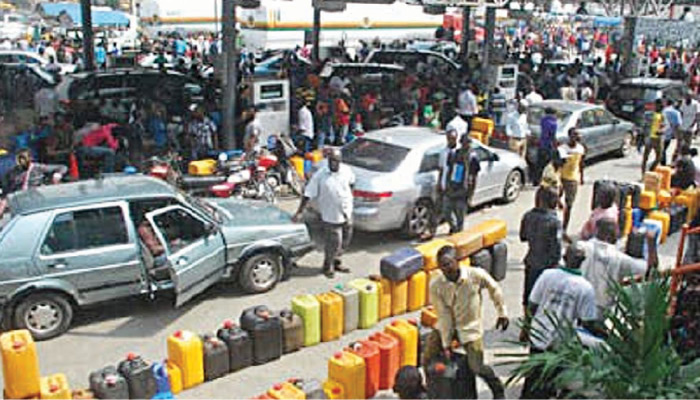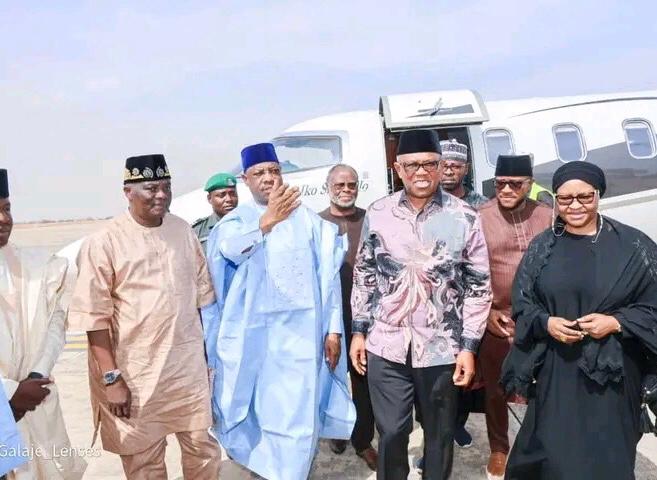As mixed reactions continue to trail the declaration of a state of emergency in Rivers State by President Bola Tinubu, the Peoples Democratic Party Governors’ Forum has said it will take legal action against the Federal Government.
The PUNCH had reported that President Tinubu declared a state of emergency in Rivers State and suspended Governor Siminalayi Fubara; his deputy, Ngozi Odu; as well as members of the state House of Assembly for six months.
The President then appointed Vice Admiral Ibok-Ette Ibas (retd.) as the Sole Administrator of the state.
The PDP governors contended that the President’s actions were unconstitutional and threatened Nigeria’s democratic principles.
Seeking legal intervention, the Oyo State Governor, Seyi Makinde, criticised the declaration of a state of emergency in the state, adding that the party’s governors’ forum would challenge the matter in court.
Makinde, in his bi-weekly newsletter— The Business of Governance (Issue 110)— noted that the suspension of democracy in the state was an illegal act that all well-meaning Nigerians must condemn.
The governor said, “I am glad that our great party, the PDP, is demonstrating the needed strength and leadership. The PDP Governors’ Forum rose from an emergency meeting where we unanimously decided to challenge the actions of President Tinubu in a court of competent jurisdiction. We cannot fold our hands and watch the democracy we built for almost three decades be trampled upon.
“I stand today to say that the declaration of the state of emergency in Rivers State and the suspension of the executive and legislative arms of government by the presidency is an illegality that right-thinking members of society must oppose.
“Our democratic tenets must never be trifled with, no matter our personal feelings and loyalties. This is the time to take a stand for fairness, equity and justice.”
Makinde urged Nigerians to speak out whenever anything threatened the nation’s progress.
Showing support for the governors’ forum, the Deputy National Youth Leader of the party, Timothy Osadolor, said the state of emergency would be challenged in court.
Speaking with Saturday PUNCH, Osadolor noted that President Tinubu was unmindful of the implications of his pronouncement.
The youth leader added that the court remained the last hope of the common man.
Osadolor said, “The President lacks the locus to suspend two elected arms of government; the legislature and executive in the state. There is no place in the Constitution of the Federal Republic of Nigeria that gives such powers.
“Has the President forgotten that the office is guided by law? Although he has the right to declare a state of emergency, there is nowhere it is stated that he can suspend officials. President Goodluck Jonathan declared a state of emergency in the past, and the governors still held the forte in their states.”
Corroborating Osadolor, a sociopolitical group, Niger Delta Youth Council, expressed full support for the PDP Governors’ Forum in their resolve to challenge the state of emergency in court.
This was contained in a statement by the President of the NDYC, Bene Mamamu, on Friday.
He alleged that the state of emergency declared on Rivers by President Tinubu “is an expression of his bias and hatred for the Niger Delta region.”
Reverse emergency rule, Ijaw group tells Tinubu
Meanwhile, an advocacy group, Ijaw People’s Association, decried the state of emergency, describing it as a “desecration of democracy” and “desperation taken too far”.
The IPA called on the President to show that he was a democrat by reversing the decision in the interest of peace and proper development to take place.
The President of the group, Patrick Ebikebuno, stated this while speaking with newsmen in Port Harcourt.
Ebikebuno noted that the declaration was disturbing for the Ijaw nation, including people of the ethnic group in Ondo, Delta, Akwa Ibom, and Bayelsa states.
He emphasised the peaceful nature of the Ijaw people, stating, “We are gentle in character and very accommodating.”
The South-South Governors’ Forum had earlier called for the reversal of the state of emergency in Rivers State.
This was in a statement signed by the Chairman of the South-South Governors’ Forum, Governor Douye Diri of Bayelsa State, in Yenagoa, the state capital.
According to the forum, the political crisis in Rivers State ought to be ideally resolved through legal and constitutional means rather than by executive fiat.
Meanwhile, the Government of Cross River State distanced itself from the position of the South-South Governors’ Forum’s to reject the emergency rule in Rivers.
The acting Governor of the state, Dr Peter Odey, said the government fully aligned itself with President Tinubu’s quest to bring peace and stability to the oil-rich state.
In a statement by his Chief Press Secretary, Fred Ekpong, Odey said Cross River State was not consulted before the forum came out with its position.
Also rejecting the region’s governors’ stance, the Edo State Government dissociated itself from opposing the emergency rule declared in Rivers State.
In a statement by the Chief Press Secretary to the governor, Fred Itua, the government stated that the step taken by President Tinubu was based on his understanding of the issue.
Showing support for the President, Governor Hope Uzodimma of Imo State expressed support for the declaration, describing it as a crucial move to ensure national security.
Emergency rule ‘democratic Armageddon’ – Bode George
Meanwhile, speaking on Friday in an interview on Arise TV, a former Deputy National Vice Chairman of the PDP, Bode George, condemned the declaration of a state of emergency in Rivers State by the President, describing it as an unconstitutional move aimed at political control.
George said, “Even if you want to declare a state of emergency, there are conditions. To me, this is a revisit of a democratic Armageddon in Nigeria, and we have to be extremely careful.”
George also took a swipe at Wike over his revocation of the PDP secretariat’s Certificate of Occupancy in Abuja, saying the minister should remember that the party was instrumental to his political rise.
Kwankwaso knocks NASS
The NNPP presidential candidate in the 2023 general elections, Rabiu Kwankwaso, expressed reservations for the declaration of a state of emergency in Rivers State.
Confirming his opposition in a statement shared on Friday via his verified Facebook page, Kwankwaso also reflected on previous political misadventures and warned against repeating history.
Administrator receives withheld LG funds, other salaries
Addressing the heads of local government administrations, the state’s Sole Administrator, Ibas, allayed concerns over unpaid salaries, assuring them of his commitment by confirming the release of the withheld state allocation.
He said, “Let me assure you that the withheld allocations have now been released, and I hereby issue a directive that all the necessary steps be taken to ensure that the salaries are paid without any further delay.”
Earlier, in a separate meeting with monarchs, he warned against encouraging cultism and other vices in their communities.
However, a source within the Presidency revealed that the appointment of a sole administrator in Rivers State was aimed at reconciling the warring factions and stabilising the political landscape, rather than imposing full emergency rule.
According to the source, the move is in line with ongoing efforts by the Senate and South-South governors to mediate between the feuding parties.
“These are suggestions on the table. Customarily, the idea of an emergency rule is to allow the parties involved time to cool off and come to a resolution,” the source stated.
IYC drags FG before ECOWAS court
Members of the Ijaw Youth Council have filed a lawsuit against the Federal Government at the Community Court of Justice of the Economic Community of West African States in Abuja, challenging the declaration of emergency rule in Rivers State.
The suit, dated March 20, 2025, lists the applicants as Comrade Ibiso, John Benjamin, Alpheus Ngere, Tamunokuro Tomquin, Benjamin Kemuel, Fabians Abbey, Williams Toby, Dabo Briggs, Precious Otoni, Attah Ebirin, and Tonye Stephen.
The applicants are seeking an order from the ECOWAS Court to set aside the suspension of elected officials and the dissolution of democratic structures in Rivers State.
Additionally, they are requesting a court order nullifying all decisions made by Vice Admiral Ibok-Ette Ibas (retd.), the sole administrator appointed by the President.
The suit also demands $10m in punitive and exemplary damages for the alleged violations and hardships caused by the Federal Government’s actions.
The Chairman of the Host Communities of Nigeria Producing Oil and Gas, Dr Michael Emuh, urged the Federal Government to utilise trained youths for pipeline surveillance in the region.
Emuh, in a statement on Friday made available to Saturday PUNCH, called for caution and strategic action to protect the nation’s economic interests.
APC, opposition lawmakers clash
In another development, the ruling APC chided aggrieved opposition lawmakers and critics of the state of emergency, saying the action was in the best interest of the people.
The reaction came in the wake of renewed agitation by the senator representing Bayelsa West, Seriake Dickson; and his counterpart in the Federal Capital Territory, Senator Ireti Kingibe.
The National Assembly, on Thursday, endorsed the state of emergency imposed on Rivers State by President Tinubu.
The resolution was taken at separate plenary sessions of the two chambers, where they deliberated on the suspension of the state governor, his deputy, and the state assembly members.
The parliament backed Tinubu’s proclamation through a voice vote amidst calls from opposition leaders to reject it.
On Friday, Kingibe condemned the use of a voice vote in approving the declaration of emergency rule in Rivers State.
The FCT senator said the required two-thirds majority consensus could not be accurately determined by a mere voice vote.
Dickson, another high-ranking senator, opposed the emergency rule in Rivers State, describing it as unconstitutional.
In a statement released on Friday, the former Bayelsa State governor voiced his objections.
The lawmaker had, during Thursday’s plenary session at the Senate, argued that the declaration fell short of constitutional requirements.
“As I have stated repeatedly, I raised my objections during the closed session on how the declaration fell short of constitutional prescription, based on my views as a democrat sworn to uphold the Nigerian Constitution,” Dickson stated.
Dickson particularly commended Senator Aminu Tambuwal for challenging the legality of suspending elected officials in Rivers State.
He criticised the Senate President, accusing him of attempting to silence him and misrepresent his statements.
The former governor further argued that senators did not need the permission of the Senate President to express their views on national issues.
Reacting, the National Secretary of the APC, Senator Ajibola Basiru, dismissed their protests.
Basiru told Saturday PUNCH that there was no need to stir up the emotions of Nigerians, as the aggrieved lawmakers were doing, insisting that the President made the right decision.
His sentiment was shared by the APC National Vice Chairman (South-East), Dr Ijeoma Arodiogbu, who stated that it was obvious the opposing lawmakers were playing to the gallery.
Fubara alive, well – Kinsmen
Controversy surrounding the whereabouts of the suspended governor was laid to rest on Friday as a close family source said he was alive and well.
Though the source, who pleaded anonymity, said she would not disclose the governor’s whereabouts, she confirmed that he was doing fine.
“I have spoken to the governor, and there is no cause for alarm,” the source added.
This comes as some members of the Rivers State Elders and Leaders Council had raised the alarm over the whereabouts of the suspended governor, saying that they had yet to hear from him since he was suspended.

















